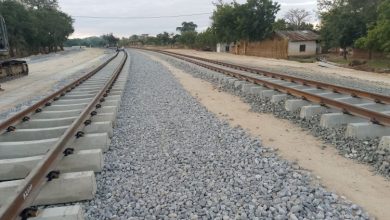Smallholder farmers boost yields
Mary Sabola, a smallholder farmer from Kachingwe Village, Traditional Authority M’biza in Zomba, is defying erratic rainfall and other extreme weather conditions.
Despite these climate challenges, she has been achieving bumper harvests and increased income.
The farmer, who could not produce enough food for her family, attributes this turnaround to modern farming technologies she adopted to improve productivity and reduce production costs.
She is among farmers participating in Farmer Field Demonstration Tours organised by the Centre for Agricultural Transformation (CAT) at Makoka Smart Farm.

The peer-to-peer learning sessions have also been underway at Bunda and Natural Resources College (NRC) farms in Lilongwe.
In April this year, Sabola participated in a demonstration tour at Makoka, which was organised by CAT in partnership with the Department of Agricultural Research Services with financial support from the Global Action to End Smoking (GA).
During the tour, smallholder farmers were introduced to a range of climate-smart agricultural technologies, which they can adopt to adapt to climate change.
These technologies included improved seed varieties, inorganic fertilisers, agrochemicals, and integrated pest management techniques.
“The improved technologies we see in the smart farms have enabled me to increase production and income through access to better markets, improved farming practices, and crop diversification. The tour also enhanced my understanding of pest management, leading to higher yields and better prices,” says Sabola.
Zomba District has been severely affected by cyclones that devastated the Southern Region. These disasters have not only claimed lives, but also destroyed crops, infrastructure, and livelihoods.
The cyclones struck just as crops were maturing, leaving farmers with no chance to recover.
Many affected smallholder farmers now depend on food aid from the government and well-wishers.
However, there are growing concerns about the long-term effects of dependency on relief aid. Some observers warn that this could deepen vulnerability and trigger prolonged food insecurity in the years to come.
Sabola and other farmers in Zomba reject dependency.
With CAT’s support, they are working toward sustainable, long-term solutions to food insecurity, deforestation and environmental degradation.
By adopting climate-smart agricultural practices and technologies, they are building resilience against future shocks.
CAT’s extension services are helping farmers understand the importance of scaling up modern technologies and using climate data to guide timely decision-making.
“Adaptation is the only solution to the climate crisis that seems to have found a home in Malawi. We are now using improved agricultural technologies to adapt to climate change,” Sabola reflected.
CAT executive director Macleod Nkhoma spoke of the organisation’s comprehensive approach to building smallholder farmer capacity through science, technology and innovation.
“At the agri-clinics, which we organise in established remote demonstration plots across the country, we showcase technologies that help farmers mitigate the effects of climate change. We also train them in small-scale irrigation systems that enable year-round crop production,” he explained.
Nkhoma also noted that CAT is raising awareness about the role of deforestation in climate change and has introduced tree-planting initiatives to help restore forest cover through ecosystem restoration initiatives.
A cornerstone of CAT’s climate resilience strategy is diversification—growing multiple crop varieties and raising different livestock species.
Nkhoma explained that diversification spreads risk, improves soil health through the practice of crop rotation, and helps manage pests and diseases.
“The farmers we work with are experimenting with early maturing crop varieties, drought-tolerant seeds and exploring niche markets for specialty crops and livestock. These strategies increase resilience, optimise resource use, and reduce emissions,” he said.
With CAT support, smallholder farmers in Zomba and beyond are realising high yields and incomes while demonstrating that climate-smart agriculture is not only possible, but effective in transforming lives and livelihoods.
By focusing on increasing production and household incomes, their proactive steps offer a replicable model for communities across Malawi to break the cycle of food insecurity and build a more sustainable, resilient future.
Farmers on a learning visit to Makoka Demonstration Farm in Zomba. | Watipaso Mzungu





